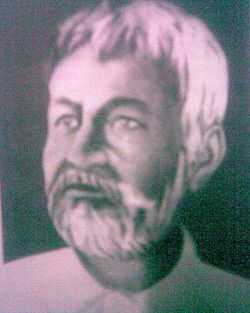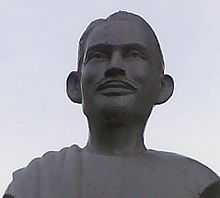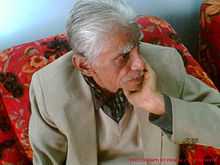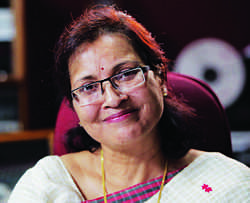Assamese Brahmins
 | ||||||||||||||||
| ||||||||||||||||
| Languages | ||||||||||||||||
|---|---|---|---|---|---|---|---|---|---|---|---|---|---|---|---|---|
|
• | ||||||||||||||||
| Religion | ||||||||||||||||
|
| ||||||||||||||||
| Related ethnic groups | ||||||||||||||||
| Indo-Aryan peoples, Brahmin, Barooah, Sarma, Chakrabarty, Goswami | ||||||||||||||||
Asamiya Brahmins (Assamese: অসমীয়া ব্ৰাহ্মণ,Hindi: असमिया ब्राह्मण or Hindi: असमी ब्राह्मण) constitute the Indo-aryan community of Assam. Brahmins are found everywhere in Assam and surrounding areas however, most predominantly in Jorhat, Nalbari, Barpeta, Goalpara and Darrang districts.
Most of the Barooahs, Puzaris, Borthakurs, Rajkhowa, Bezborah, Phukan and Khounds are found in Jorhat.
Description
Brahmins of Assam Valley belong to the group of Indo-aryan people, who are usually fair, tall and long headed and are believed to be having their origins as far as West Bengal to Kannauj.[1] There is a myth that the Ahoms brought the Brahmins to Assam for worshiping goddess Kamakhya but the fact is that Brahmins were present in Assam much earlier to the advent Ahoms and hence also known as Kamrupi Brahmins. During the reign of Koch Kings the Kamrupi Brahmins were quite prosperous. In fact one of the earliest king of the Ahom Dynasty is known as Bamuni konwar as because he was brought up by a Brahmin family and till that time the Ahom kings were not Hindu and as such there is no question of Ahoms inviting Brahmins to Assam. Although Brahmins in Assam are same as per their faith and customs with that of any other Brahmin community across India but they are Saakta or worshiper of Shakti and are non vegetarian. Certain regional beliefs and customs may exist which may be distinct to the Brahmins in the state. Unlike Brahmins in other parts of India, they may eat non-vegetarian food which includes mostly Fish, Pigeon, Duck, Chicken, Mutton and Eggs. Each Brahmin family within the community belongs to a specific Gotra (Brahmin identity surname) which is unique to a family thereby indicating their origin or the Lineage. Many of the Brahmins in Assam write the conferred titles either given to them as a gift by the Ahom kings or else which they have adopted being in Assam for a long time.
A. Surnames
1. Barua, Baruah, Barooah, Baroova, Borooah or other spellings of the same surname.
Under this there may exist middle names/titles/prefixes that give the distinction of being Brahmins. Some of common middle names or prefixes:
*Bez - Borah, Baruah, Barooah
*Bor/Bar - Baruah/Barooah
*Bujar - Baruah/Barooah
*Chandra - Baruah, Barooah
*Ram/Raam - Baruah, Barooah
*Ranjan - Baruah, Barooah
*Prasad - Baruah, Barooah
*Govind/Govinda - Baruah, Barooah
*Krisnakant/Krishnakanta - Baruah, Barooah etc...
2. Acharya/Acharjee
3. Bhattacharjee/Bhattacharya
4. Bhagawati/Bhagwati
5. Bardoloi/Bordoloi/Bardalai
6. Bor/Bar - Kotoki/Katakey/Kataki/Pujari/Poojari/Puzari
7. Bor/Bar - Thakur/Thakore also, very rarely Borethakur/ore
8. Chakravarti/Chakraborti
10.Goswami
11. Khound
12. Kotoky, Katakey
13. Parashar
14. Pujari/Poojari/Puzari
15. Phukan/Phookan
16. Rajkhowa
17. Sarma/Sarmah/Sharma
18. Siddhant/Siddhanta
19. Savapandit
20. Shrutikar
21. Thakur/Thakore
22. Pathak
23. Rajguru/Razguru
24. Tamuli (Sarma Tamuli)
Apart from the above, certain other surnames though not very common (as these surnames are written by Kalitas), may rarely be used such as, Changkakati, Chaliha, Khatoniar, Choudhury, by fewer Brahmins of Assam. Besides these, Baruahs, Rajkhowas and Phukans are equally present among Ahoms (non-Indo-Aryan community) and Kalita, though it is not common to see "Baruah" to be spelled as "Barooah" by Ahoms. Boruah and Borah are also common surnames among the Sutiya community.
Bharman. Gotras
- Atri - Krishnatriya
- Bashistha/Vashistha
- Bhadraj/Bharadwaaj/Bhardwaj/Bharadwaj
- Bhargav
- Chandilya/Shandilya/Sandilya
- Gautam
- Kashyap
- Kaushik
- Kondinnya/Kondolya
- Katyayana
- Mihirayan
- Madhukalya
- Parasara/Porasor/ Parasor/Porasar
- Kopil/Kapil
- Rishi Alambh- Alambayan/Alamayan/Alimman/alabyan/alamba
Brahmins in Assam strictly follow deity worship though they may pray and worship saints of Assamese community. Assamese Brahmans are less rigid than Brahmans of other parts of the country regarding religious and communal matter.
See also
- Ganak
- List of Notable Assamese Brahmins










.jpg)
